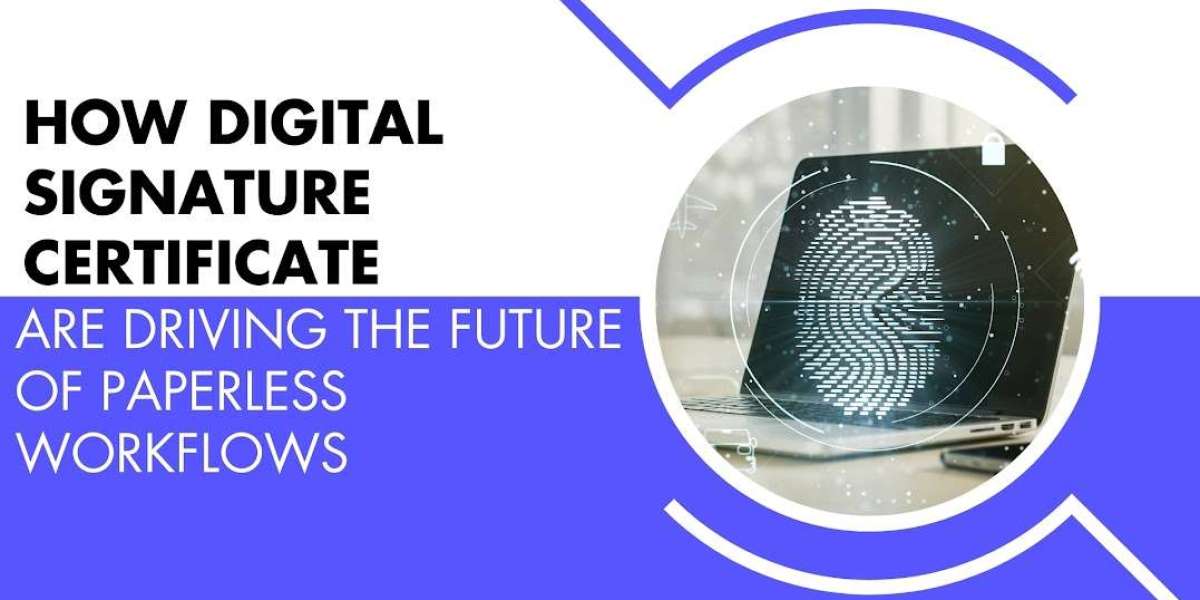In today’s fast-paced digital landscape, businesses and organizations are increasingly adopting paperless workflows to enhance efficiency, reduce costs, and promote sustainability. At the heart of this transformation lies the Digital Signature Certificate (DSC)—a secure and legally recognized method of authenticating digital documents and transactions. Digital Signature Certificates play a crucial role in eliminating the need for physical paperwork, ensuring data security, and streamlining business processes. This article explores how DSCs are driving the future of paperless workflows, their benefits, and their role in various industries.
Understanding Digital Signature Certificates
A Digital Signature Certificate (DSC) is an electronic credential used to validate the authenticity and integrity of digital documents. It is issued by a Certifying Authority (CA) and serves as a digital equivalent of a handwritten signature or a stamped seal. A DSC contains key information, including the user’s name, email address, public key, and certificate validity details.
Digital signatures use public key infrastructure (PKI) technology, which ensures secure encryption and decryption processes, making it nearly impossible for unauthorized users to alter signed documents. DSCs are legally recognized in many countries, and they comply with frameworks such as the Information Technology Act, of 2000 in India and eIDAS Regulation in the European Union.
Steps to Apply for Digital Signature Certificate
Step 1: Visit Our Website
Go to our website to start the process.
Step 2: Fill in Your Details
User Type: Choose if you are an individual or an organization.
Certificate Type: Pick if you need it just for signing documents or for both signing and encryption.
Validity: Choose how long you want the certificate to last.
Personal Info: Enter your name, phone number, email, and address.
Agree to Terms: Check the box to agree to the terms.
Submit: Click the submit button.
Step 3: Choose Token Option
Already Have a Token?: If you have a USB token, choose "No." If you need a new one, choose "Yes."
Step 4: Make Payment
Payment: Enter your payment details and choose how you want to pay (net banking, credit card, debit card, or UPI).
Step 5: Complete the Process
Review: Make sure all your information is correct.
Submit: Click submit and wait for a confirmation email.
Step 6: Get Your digital signature
You’ll receive your digital signature on a USB token drive after processing.
The Shift Towards Paperless Workflows
Traditional business operations rely heavily on physical documents, which leads to inefficiencies, delays, and security risks. The need for paperless workflows has grown due to factors such as:
The increasing adoption of remote work and digital collaboration tools
The rise of cloud-based document management systems
The push for environmentally sustainable business practices
The demand for faster, more secure transactions
Digital Signature Certificates play a pivotal role in facilitating this transition by ensuring that digital documents are legally binding, tamper-proof, and easily verifiable.
Benefits of Digital Signature Certificates in Paperless Workflows
1. Enhanced Security and Authentication
Digital Signature Certificates use encryption techniques to protect sensitive documents from fraud, unauthorized alterations, and cyber threats. By employing asymmetric cryptography, DSCs ensure that only the intended recipient can access and verify a document.
2. Legal Validity and Compliance
Many governments and regulatory bodies recognize DSCs as legally binding, making them essential for e-contracts, tax filings, and regulatory submissions. Organizations can comply with international standards such as GDPR, HIPAA, and SOX by using DSCs to authenticate electronic records.
3. Improved Efficiency and Cost Savings
By eliminating the need for physical documentation, printing, and courier services, businesses can save on operational costs and reduce processing time. Employees can sign and send documents within seconds, enhancing workflow automation and reducing turnaround times.
4. Remote Accessibility and Collaboration
With digital signatures, professionals can sign, share, and approve documents from anywhere, fostering seamless collaboration in remote work environments. This is particularly beneficial for global organizations that operate across multiple time zones.
5. Environmental Sustainability
Going paperless with Digital Signature Certificates significantly reduces paper waste, carbon footprint, and energy consumption. Organizations adopting sustainable digital practices not only contribute to environmental conservation but also enhance their corporate social responsibility (CSR) profiles.
How Digital Signature Certificates Are Transforming Industries
1. Banking and Financial Services
The banking sector extensively uses DSCs to ensure secure online transactions, loan approvals, and compliance with Know Your Customer (KYC) regulations. Digital signatures help financial institutions minimize paperwork while enhancing security and efficiency.
2. Legal and Contract Management
Law firms and corporate legal departments leverage Digital Signature Certificates for contract execution, affidavits, and legal documentation. DSCs ensure that signed agreements remain legally binding and tamper-proof.
3. Healthcare and Pharmaceuticals
Healthcare organizations use DSCs to sign patient records, e-prescriptions, and insurance claims, ensuring compliance with HIPAA and GDPR regulations. The pharmaceutical industry relies on digital signatures to authenticate clinical trial data and regulatory submissions.
4. Government and Public Sector
Governments worldwide are adopting DSCs for tax filings, e-tendering, procurement, and inter-departmental communications. Digital signatures streamline bureaucratic processes, making public services more accessible and efficient.
5. E-Commerce and Supply Chain Management
Digital signatures facilitate secure online transactions, vendor agreements, and logistics documentation in the e-commerce and supply chain sectors. They help ensure authenticity, data integrity, and faster processing of trade documents.
6. Education and E-Learning
Educational institutions use DSCs for issuing digital certificates, transcripts, and online admission processes. This ensures the authenticity of academic records and simplifies administrative tasks.
Future Trends in Digital Signature Certificates and Paperless Workflows
1. Integration with Artificial Intelligence (AI) and Automation
AI-powered document verification systems and workflow automation tools are enhancing the efficiency of DSCs, reducing manual intervention, and accelerating digital transactions.
2. Blockchain-Based Digital Signatures
Blockchain technology is being integrated with digital signature solutions to create decentralized and tamper-proof authentication systems. This will further enhance the security and reliability of digital contracts.
3. Increased Adoption in Emerging Markets
As digital transformation continues to grow, developing economies are increasingly adopting DSCs to enhance e-governance, banking, and corporate compliance.
4. Cloud-Based Digital Signature Solutions
With the rise of Software as a Service (SaaS) platforms, businesses are embracing cloud-based digital signature solutions, allowing seamless integration with enterprise resource planning (ERP) and customer relationship management (CRM) systems.
5. Stronger Regulatory Frameworks
Governments and regulatory bodies are continuously updating legal frameworks to support digital transactions, ensuring DSCs remain a standard for secure digital interactions.
Suggested Read- Class 3 digital signature.
Conclusion
Digital Signature Certificates (DSCs) are revolutionizing the way businesses, governments, and individuals manage digital transactions and documents. By enabling secure, legally compliant, and efficient paperless workflows, DSCs are driving digital transformation across industries. As technology continues to evolve, the adoption of AI, blockchain, and cloud-based digital signature solutions will further enhance the reliability and accessibility of paperless operations.













